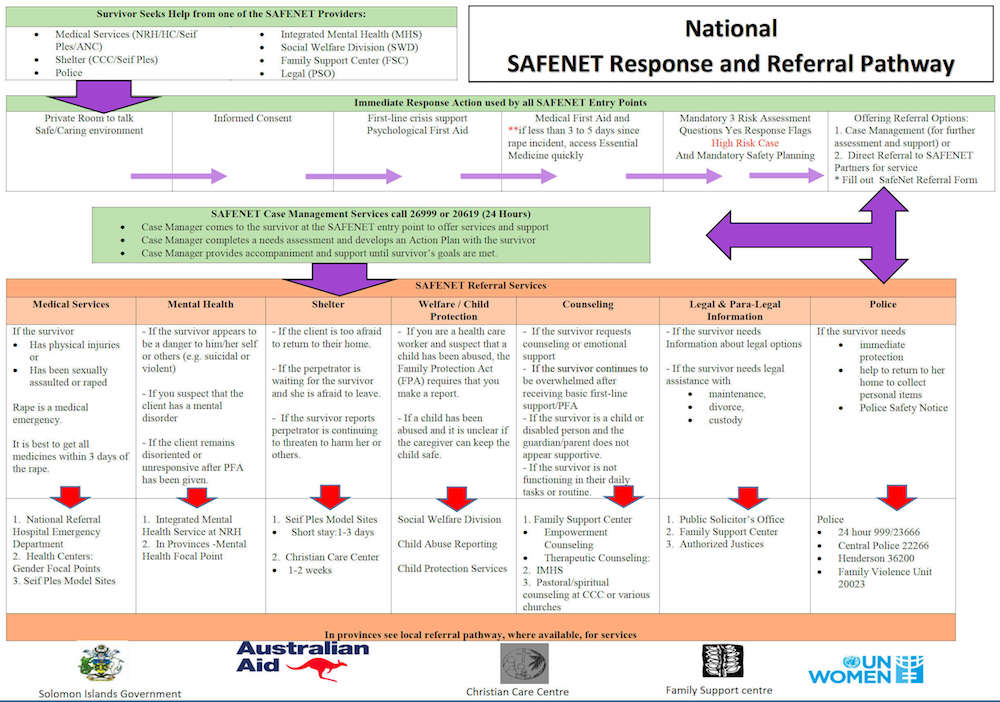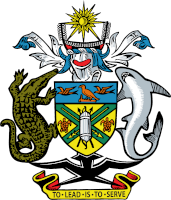The Gender Equality and Women’s Development (GEWD) Policy 2016 – 2020 (link to document) is the overarching policy framework for achieving gender equality and women’s human rights in Solomon Islands.
Other national and international frameworks and commitments for gender equality and human rights which the Solomon Islands Government has adopted such as the Convention on the Elimination of All forms of Discrimination against Women (CEDAW) and the Sustainable Development Goals (SDGs) is fundamental to the purpose of this Policy.
The Policy is premised on the vision that gender equality contributes substantially to improving the wellbeing of women, men, girls and boys—and that the promotion of gender equality must be at the heart of the government’s mission.
It recognizes that continuing to invest in women’s empowerment is vital to achieving gender equality and recognises the need for women and men to work together to address attitudinal and institutional barriers to gender equality.
Policy Priority Outcomes
- Gender responsive government programmes and services.
- Improved economic status of women.
- Equal participation of women and men at all levels of decision-making, governance and leadership.
- Preventing and responding to violence against women and girls.
- Increased awareness and acknowledgement of the role of women in peace and security.
- Increased access to education and providing a supportive school environment.
- Improved access for women’s right to sexual and reproductive health.
Gender Responsive Government Programmes and Services
The delivery of gender responsive programmes and services requires a good understanding of the diversity of needs that women and men have across all spheres of their lives.
Although the Ministry plays a strategic role in advancing gender mainstreaming across the Solomon Islands Government, it is the responsibility of all government sectors and ministries to support the process. While efforts have been made to integrate women’s concerns into some sector policies, plans and processes, more systematic efforts need to be made to achieve significant results.
In 2014, gender focal points were appointed in each ministry as part of the Public Service Commission reform processes. The role of the focal points is to support senior managers in the institutionalisation of gender mainstreaming within the ministry.
The gender focal point system is a key entry point for supporting the achievement of a gender responsive government programmes and services. The MWYCFA will continue to provide technical advice and support to gender focal points in order to strengthen their ability to undertake gender analysis and to build a cadre of civil servants with gender expertise.
Equal Participation of Women & Men at all Levels of Decision making, Governance & Leadership
Women are underrepresented in all levels of decision making in the Solomon Islands. Although there has been an increase in the number of women in senior and mid-level public service positions, representation of women in parliament remains very low.
- Only 5% of senior public servant positions and 22% of mid-level positions are occupied by women (ADB 2015).
- 2014 to current – only 3 out of 24 Permanent Secretaries are women.
- Women represented 6% of all candidates in the 2014 national election. There were 26 women candidates, unchanged from the number contesting the 2010 election.
- 1993 to current – only 5 female Parliamentarians.
The Ministry and partners in the Women in Shared Decision Making coalition have been active nationwide, promoting the need for TSMs to be introduced at the national and provincial government level. The Ministry together with Provincial Women Leaders and national stakeholders advocate to include TSM in the Provincial Government Act amendments.
Preventing and responding to violence against women and girls
Violence against women and girls is too common in Solomon Islands. Nearly two in three women between the age of 15 and 49 have experienced violence.
Results of the 2009 Family Health and Safety Survey also shows that 42% of young women who had their first sexual experience before the age of 15 reported that it was forced. Violence against women and girls is condoned. The majority of women, 73% believe that a man is justified in beating his wife under some circumstances, in particular, for infidelity and disobedience.
Solomon Islands Government recognises the growing gender inequalities and high prevalence of violence against women and girls and commits to several global and regional commitments to gender equality including the Convention on the Elimination of all Forms of Discrimination against Women (CEDAW).
The passing of the Family Protection Act 2014 (FPA) marked the culmination of many years of lobbying by the government and civil society. This Act criminalises domestic violence and provides increased protection, and promotes the safety, health and well-being of victims of domestic violence. This includes physical, sexual, psychological and economic abuse. It also defines the types of relationships in which domestic violence can occur.
The National Policy to Eliminate Violence against Women and Girls (EVAWG) 2016-2020 provides a framework to implement Solomon Island’s national, international and regional commitments to eliminate violence against women and girls. The Policy corresponds to Outcome 4: Preventing and responding to violence against women and girls, of the Gender Equality and Women’s Development (GEWD) Policy.
The Ministry is working closely with SAFENET to strengthen the SAFENET referral system for women victims and ensure quality services for all women in al provinces, and ensure accessibility for all women, including women with disability.
 (SAFENET - A formal referral system comprising of both government and non-government agencies established to provide coordinated, frontline services and support to survivors/victims of gender-based violence.)
(SAFENET - A formal referral system comprising of both government and non-government agencies established to provide coordinated, frontline services and support to survivors/victims of gender-based violence.)
16 Days of Activism Against Gender-Based Violence is an international campaign to challenge violence against women and girls. The campaign runs every year from 25 November, the International Day for the Elimination of Violence against Women, to 10 December, Human Rights Day.
Improved Economic Status of Women
There is a large gender gap between paid and unpaid work. Women make up just over half (56%) of all unpaid workers, and only one third (33%) of paid workers. There is evidence that some women do not have autonomy over their earnings, nor are they able to contribute to some household decisions. This affects their level of economic empowerment. Women’s economic empowerment is the ability of women to bring about positive changes in their lives and that of their families and societies as a result of their participation in economic activities.
Improving the Economic status of women is a policy priority of the government. The Ministry is mandated by the Gender Equality and Women’s Development (GEWD) Policy to coordinate the government’s commitment to addressing gender equality and advancing the economic status of women in the Solomon Islands.
The National Strategy on the Economic Empowerment of Women and Girls (NSEEWG) is designed to enhance gender equality and improve the economic status of Solomon Islands women.
The Strategy ensures women economically empowered, will enable them to contribute more to improving their children and families, work to strengthen their communities, participate in sustainable development, create more stable, just and equitable societies and importantly, in nation building.
Financial inclusion is one of key focus areas under the strategy on saving schemes targeting informal sector. The MWYCFA conducts training on financial literacy, saving schemes and access to affordable financial services for rural women and girls. Eighty-nine women savings clubs/ groups were established and trained across all 10 provinces. These savings clubs are closely monitored by the Provincial Women’s Desk Officers in their respective provinces.
Improved Access for Women’s Right to Sexual and Reproductive Health
Although health services in the country are free, geographic inequity of healthcare centres is an issue that makes accessibility harder for women – especially if they cannot afford costs for transportation or if they need to seek permission from their husband or partner to attend a Health clinic.
The Government recognises that there is a need to improve access to healthcare, and in particular to reproductive and sexual healthcare services, and to raise widespread awareness of women’s rights to sexual and reproductive health.
Improved access to Education and providing a supportive school environment.
Education provides an opportunity to change gender stereotypical mind-sets, thus it is a critical entry point for promoting gender equality. There have been improvements in the access to education for girls, but there are still barriers to full participation and enjoyment of the school process for these girls.
Net enrolment rates at secondary school are low for both girls and boys, and women made up only 38% of the total estimated enrolment in tertiary education in 2012 (ADB 2015).
The Government recognises that here is an urgent need to strengthen gender analysis into education policy plans and strategies to ensure gender equity in access to education.
Gender & Women’s Documents
Legislation - pdf Family Protection Act 2014 (390 KB)
Treaties - pdf Convention on the Elimination of All Forms of Discrimination Against Women (90 KB)
Reports/Assessments
pdf Solomon Islands CEDAW Combined Initial, Second and Third Periodic Report 2012 (3.32 MB)
pdf Solomon Islands Country Gender Assessment (2.44 MB)
pdf Solomon Gender Equality - Where do We Stand? (1.78 MB)
pdf SAFENET Assessment - National Action Plan 2014-2016 (2.00 MB)
Policies and Strategies
pdf National Gender Equality and Women's Development Policy 2016-2020 (2.01 MB)
pdf National Policy to Eliminate Violence Against Women and Girls 2016-2020 (2.64 MB)
pdf A National Strategy for the Economic Empowerment of Women and Girls (2.31 MB)
pdf Women, Peace and Security National Action Plan 2017-2020 (1.81 MB)
